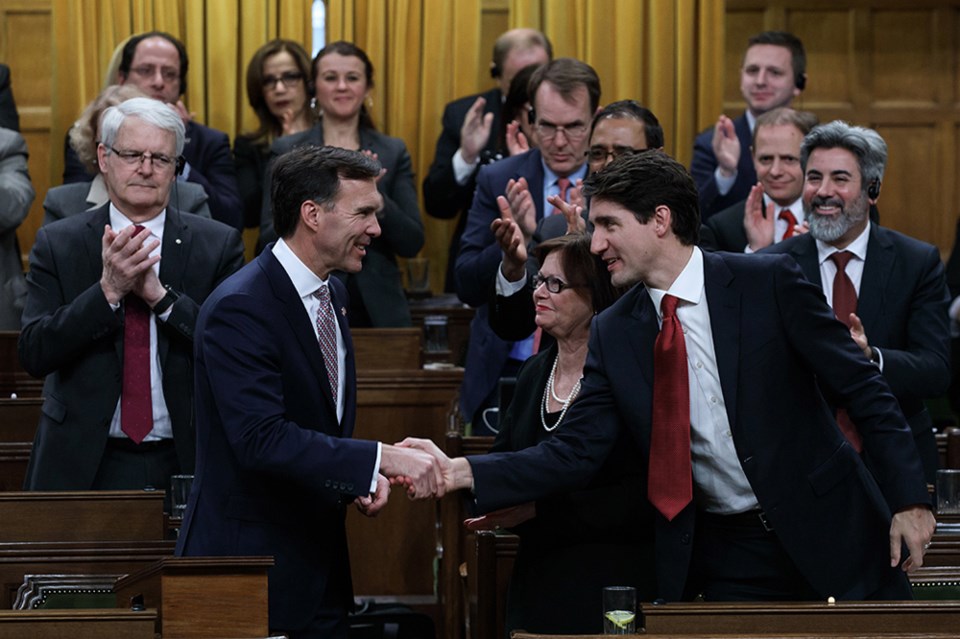The deficit got bigger and it is not expected to go down very quickly.
The federal government’s release of their second budget on March 22 with Finance Minister Bill Morneau’s address in the House of Commons comes with a $28.5 billion deficit in 2018.
According to Minister Morneau this is going to be a common thread for the next five years with very little deficit decrease.
This is a concern for Carlton Trail — Eagle Creek MP Kelly Block and Moose Jaw — Lake Centre — Lanigan MP Tom Lukiwski, who both say these debts are going to affect future generations with the Liberal’s spending.
”This budget continues us on the track of structure deficit,” says Block. “Year after year we’re seeing large deficits that will add up over time.”
Liberal MP for Regina — Wascana, Ralph Goodale, said the same about economic growth in the country, saying that the economy is just not generating growth and jobs.
The areas that the government are investing in are ones that are going to grow the economy, says Goodale.
“We’ve noticed now in the last quarter that those investments are paying off because we’ve seen the unemployment rate come down substantially. We’ve seen the job creation rate go up. And we’ve seen the overall economic growth rate coming in at 2.5 per cent, which is the best that’s been in a very long time.”
Unpacking the comments made by Goodale, according to Statistics Canada, the unemployment rate has fallen from 7.1 per cent in November of 2015 to 6.6 per cent in February 2017.
For job creation, 154,000 part-time jobs were created in 2016 with very little change made to the number of full-time.
Before the budget was released, Smith was not expecting such a large deficit since the Liberal Party promised a smaller deficit over a shorter period of time at election time.
For Lukiwski he sees this as the Liberals going back on this modest deficit and a balanced budget by 2019 promise.
Some analysts say there will be very little hope of a balanced budget until around 2055, says Lukiwski.
With little money coming out the door, this is a spending problem, says Lukiwski, with no plan to get back to a balanced budget.
“That debt that we’re accumulating at a record pace has to be repaid and I think that’s what a lot of people don’t appreciate.”
Besides having to deal with the impact of the deficit, rural Canada, similar to the 2016 budget, is just getting the crumbs, says Block, with little going towards agriculture producers.
Even in a cut back budget, PAMI Vice President of Saskatchewan Operations David Yee says that he sees Saskatchewan getting their fair share of agriculture spending.
Especially with those six industries receiving new money for innovation, he sees many opportunities for digital and precision agriculture and clean tech and greenhouse gas reduction technologies.
But their focus on innovation, infrastructure spending in rural Saskatchewan seems to be coming under question.
The shift towards transit infrastructure, Block says this means money shifting away from things like roads, wastewater, and clean drinking water.
That means a shift from broader community benefits to more benefits for major urban centres, she says.
For cities like Humboldt, it is a wait and see on how this infrastructure planning will affect the community.
“Details of these announcements need to be clarified, earmarked funding to assist with the critical infrastructure needs of smaller communities and rural regions was promising,” said the City of Humboldt in a press release.
The City is also excited about the Canada Infrastructure Bank and the data collection program that will take a look at collecting and analyzing information on municipal and provincial infrastructure, said the release, but there are questions on whether they are eligible for actual funding.
According to the budget documents, “large, transformative projects,” are the ones being targeted by the fund.
According to Prince Albert MP Randy Hoback, this means that smaller municipal projects might just miss out.
More questions do need to be answered, many of which are slated for the fall review, the next major release from the Department of Finance.
Block would not even begin to speculate what will come from that.
Right now, there is a lot of talk about items that are not off the table, including the Capital Gains increase and the sale of some airports.
“These are some things that they held off putting in their budget but I don’t think that they are off the table.”
Despite the holes in the budget, Block says she is very happy to see the Caregivers Tax Credit expand the availability of help for those taking care of a loved one and expanding the number of weeks for maternity and parental leave.
Both of these were announced with the Conservative election platform in 2015 and Block says she is happy to see the government take those on.
Lukiwski does appreciate the money going into affordable housing which is a problem in urban areas. However, it is $21.9 billion over 11 years, which Lukiwski sees as a problem.
“They’re back end loading all of it because they just don’t have any money to spend.”

.png;w=120;h=80;mode=crop)


